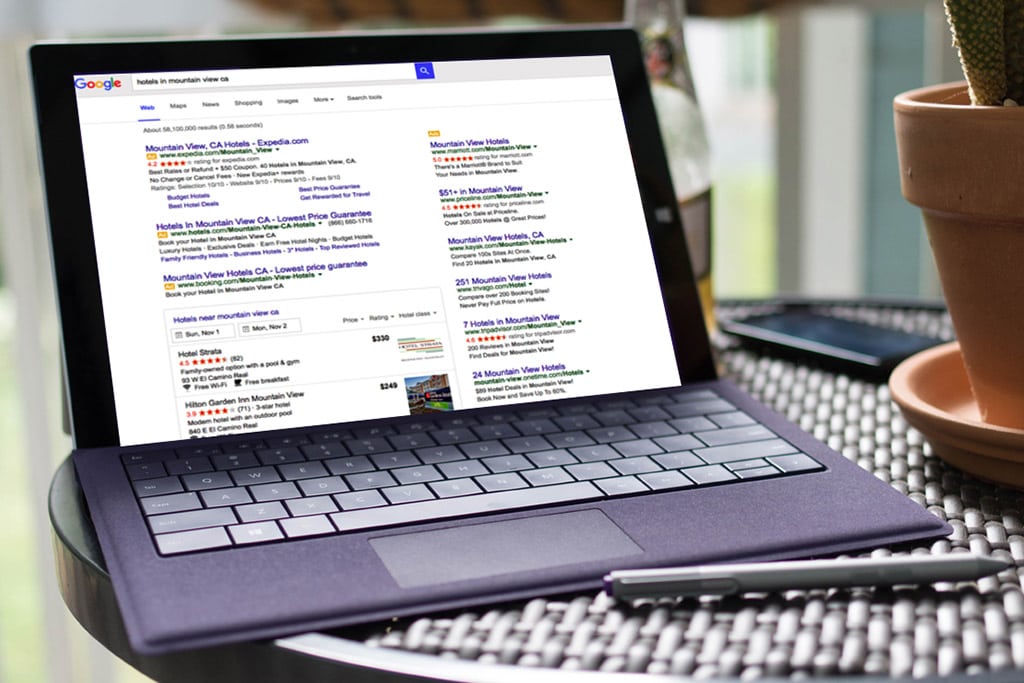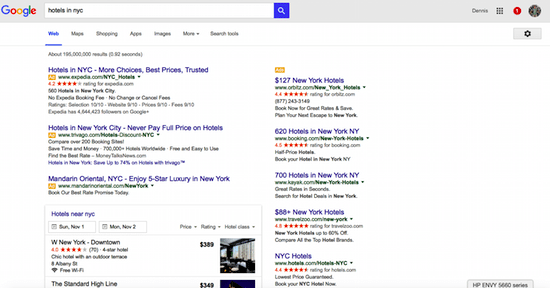Priceline.com CEO on the Death of Search Engine Optimization

Skift Take
"And so I believe it is a paid world."
With those simple words, Priceline.com CEO Paul Hennessy summarized a development that has become painfully obvious to travel brands trying to get their piece of free real estate in Google search results: Search engine optimization, the science of getting a company to surface high in Google's organic search results, is basically near death or already a fatality as Google AdWords and Google's own hotel, flight, local, shopping, and Google+ products shove organic results down the page or screen into Web and mobile oblivion.
One of the only ways to get any visibility in this paid Google environment is to spend big bucks for a text advertisement.
Consider below what's visible on a desktop screen when a user queries Google for "hotels in nyc." Google advertisements above and to the right of the only organic results, which happen to be Google's Hotel Ads product.
Attendees at the Skift Global Forum in Brooklyn, who were present for Hennessy's October 14 talk about digital conversion, might not even have noticed what he said about paid search as his words were tucked into his final statement, in response to an audience question, as the 25-minute talk wound down.
Hennessy comes to the issue of free search engine optimization versus paid search engine marketing with a lot of authority: For three and a half years through March 2015, before becoming Priceline.com CEO, he was chief marketing officer at sister company Booking.com, one of Google's largest advertisers.
When it came time for audience questions, Travis Katz, founder and CEO of social trip-planning site Gogobot, asked Hennessy the following: "Google's obviously been a tremendous funnel for the Priceline Group and you guys have shown a lot of skill in acquiring traffic. In the last couple of years Google has become much more aggressive at taking up a lot of the organic inventory [space in search results] for its own hotel metasearch product. How big a threat is that to the Priceline Group? Do you think Google is a monopoly in search and are they abusing their monopoly in what they are doing in the travel space?"
Hennessy answered: "No, I wouldn’t say they [Google] are a monopoly. They have great competitors around the world. We have been able to take the traffic off of Google and do a great job turning that traffic…customers into converted bookings for us. We will continue to do that.
“As far as SEO is, my view on that is it’s more of a desktop thought because as the devices get smaller and smaller and smaller, the number of choices from an SEO perspective on mobile decline dramatically. And so I believe it is a paid world. Google is an advertising engine and they drive paid traffic to advertisers. And I think that’s going to continue for quite some time. We will do our best to play in that environment.”
The Priceline Group has indeed played very well in that paid Google environment, building scale through hyper-efficient use of Google AdWords that few others can emulate.
While Google globally indeed has search engine competitors such as Baidu in China and Yandex in Russia, in the U.S. and Europe Google is the dominant search tool, and on desktops and in the mobile Web, too, Google AdWords dominate the shelf space.
Many travel startups, facing the daunting task of appealing to consumers in this paid marketing environment, are pivoting to a business-to-business orientation but success in that arena can also be an uphill climb.
Skift reached out to the CEOs and a managing director of several companies, including Trivago, Gogobot, GetYourGuide and Liftopia, to get their reactions to Hennessy's views on Google and search engine optimization.
Katz of Gogobot says that "SEO is a dying field" as Google uses its "monopoly" power to turn the field of search into Google's own walled garden like AOL did in the age of dial-up modems.
Johannes Thomas, managing director at hotel-metasearch engine Trivago and head of hotel product, doesn't believe SEO is dead but thinks its importance is diminishing.
"I don’t think SEO is dead but for high-volume commercial search terms its importance is certainly decreasing steadily," Thomas says. "Building a business on SEO traffic might be very risky nowadays, which was the case for Trivago several years ago."
Johannes Reck, the co-founder and CEO of Berlin-based tours and activities provider GetYourGuide, argues that the search engine optimization versus paid search debate is not especially relevant anymore because "we’re already nearing the end of the purely search engine-dominated online travel world." Reck doesn't mourn the development, though, saying the advantage will go to travel companies that can pay for the top spot because they provide the best customer experience and are especially adept at converting lookers to bookers.
Evan Reece, co-founder and CEO of ski marketplace Liftopia, concedes that SEO "is dying a bit" and says it is being superseded by Google finding ways to deliver relevant information to consumers even when they aren't necessarily looking for it.
Read their detailed responses below:
Travis Katz, Founder and CEO of Gogobot
"His (Hennessy's) statement that he does not think Google is a monopoly, that sounded like a politically correct answer, but one that overlooks the evidence. The Federal Trade Commission team that investigated Google unanimously agreed that they meet the standard of a monopoly under U.S. law, but also that they are illegally abusing their monopoly in a way that harms competition and consumers.
[Despite the antitrust team's reported views about Google's grip, the FTC ultimately did not take any action against Google.]
"I do agree with his assertion that SEO is a dying field. There is a clear trend where, in verticals that Google wants to control (travel, local search, shopping), they have been changing the interface to ensure that consumers only see content from Google or ads. This is especially pronounced on mobile, where if you search for something like 'las vegas hotels,' the entire first screen is ads, the entirety of the second screen is Google results, and only on the 3rd screen can a user find organic search content. But the problem is not limited to mobile. On desktop, we are seeing a similar trend. If you search 'las vegas hotels' on desktop, there is again, no organic search content at all above the fold. Seventy percent of the screen is dedicated to ads, with the remaining 30 percent dedicated to Google's own results.
"In many ways, what we are seeing from Google is a leveraging their monopoly in search to turn the web into their own AOL, a walled garden where the only content you see is the content that Google controls, whether or not that is the best content on the Internet.
"Certainly mobile changes the form factor, and, as Paul mentioned, there is less real estate, which makes SEO harder.
"But if you look at the data, people are still doing a lot of web searching on their mobile devices. In fact, Google announced that there are now more people searching on mobile than on desktop as of this year. And they are trusting Google to provide them with the best answers on the Internet. That should mean that SEO would continue to be a big growth driver for companies that perform well on mobile. Unfortunately, that is not happening. And I think in the long term, setting aside antitrust questions, by only surfacing either ads and their own content, they are undermining their own position over the long term, and undermining people's trust in the Google brand.
"Google knows what they are doing constitutes a bad user experience. Their own data tell them so. In fact, in 2012, they rolled out a penalty to punish sites with too many ads above the fold. In their blog post they explain: 'As we’ve mentioned previously, we’ve heard complaints from users that if they click on a result and it’s difficult to find the actual content, they aren’t happy with the experience. Rather than scrolling down the page past a slew of ads, users want to see content right away...If you click on a website and the part of the website you see first either doesn’t have a lot of visible content above-the-fold or dedicates a large fraction of the site’s initial screen real estate to ads, that’s not a very good user experience. Such sites may not rank as highly going forward.'
"So what do they do on their own site?" Katz adds. "Tons of ads, no visible content."
Johannes Thomas, Managing Director, Trivago
"I don’t think Google is wielding its monopoly; they are just evolving their product to cope with new market conditions, and are trying to improve their search experience to stay on top of the search funnel. Google has been facing a vicious circle for quite a while. Users are sticking with brands that deliver a great experience and are not coming back to Google. The whole mobile shift is accelerating this -- app users especially tend to stick with a brand. One of the few ways to escape this circle is to strengthen the value depth of your product and deepen your search funnel. Which is obviously happening.
"For SEO the impact is rather negative. Combining for instance a hotel search experience with 'traditional’ text ad formats in the search engine results pages results in loss of visibility of organic ads by nature. I don’t think SEO is dead but for high-volume commercial search terms its importance is certainly decreasing steadily. Building a business on SEO traffic might be very risky nowadays, which was the case for Trivago several years ago. We have shifted focus in order to diversify our inbound traffic and put emphasis on brand building. Apart from that, it’s also great to see that new channels such as social media and app marketing are rapidly evolving."
Johannes Reck, Co-Founder and CEO of GetYourGuide
"It’s clear that the importance of organic search for travel companies will continue to decline over time. That’s, however, not necessarily a bad thing for everyone. If you deliver the best customer experience and can pay up to be in the number one spot, you will get an even bigger share of travelers coming to your site. Ultimately, it will shift the playing field to the travel companies that offer the greatest customer experience and are best at converting customers.
"In my honest opinion, the question of SEM versus SEO is not highly relevant any longer. We’re already nearing the end of the purely search engine-dominated online travel world. The future will be much more centered around truly unique brands, differentiated inventory and strong mobile customer propositions."
Evan Reece, Co-Founder and CEO of Liftopia
"I don’t think SEO is dead, but I think that in the context of traditional search results those with the best science in paid results are starting to take priority away from those with the best pseudoscience in natural results.
"Also, in the past natural results were tied to specific searches initiated by users -- a pretty constrained world when Google wants to deliver on their broader goals. I think we’ll continue to see more of the best information landing in front of users independent of them initiating a traditional search. Basically, Google will continue to seek new ways to deliver information to users even if they are not looking for it, increasing value to people while making them do less work.
"So perhaps the way we think about SEO now, it is dying a bit. But delivering value to users has been a huge driver of success even within that old world, and brands that focus on that value creation will likely benefit from Google’s new world of delivering that value."






